After all is said and done, living a sustainable life starts with food.
If you grow your own food you know exactly how far it traveled from farm to table AND you know your farmer. 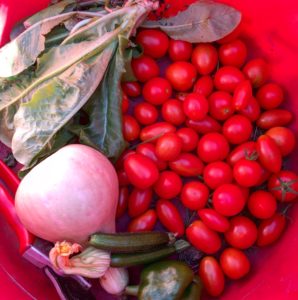 That close relationship with your farmer lets you be really clear about the inputs to the food. We signed up for a community garden plot when we moved to Philadelphia – this is our first year. What began as a chance to get our hands dirty has become something so much more. We have been delighted with the summer harvest and are delighted with the friendliness and community spirit of the garden. Here we are in October. The garden is going strong and we are planning to experiment with raising crops in a cold-frame throughout the winter.
That close relationship with your farmer lets you be really clear about the inputs to the food. We signed up for a community garden plot when we moved to Philadelphia – this is our first year. What began as a chance to get our hands dirty has become something so much more. We have been delighted with the summer harvest and are delighted with the friendliness and community spirit of the garden. Here we are in October. The garden is going strong and we are planning to experiment with raising crops in a cold-frame throughout the winter.
If you cook your own food you are intimately aware of the provenance of the ingredients. These early October tomatoes were roasted with thyme, basil and oregano from our community and backyard gardens and garlic from our garden at the beach. Then they were blended with carrots from our garden plot and celery we regrew from the stub end of organic store-bought celery.
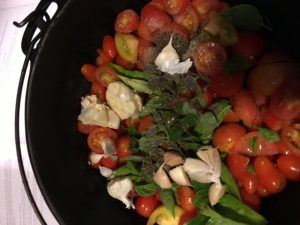
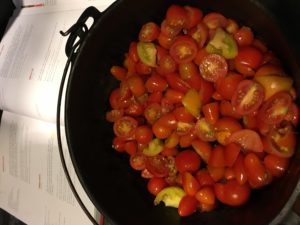
If you prep our own food you become very aware of waste. Creating this sauce, generated waste greens from the carrots that we had pulled from the garden, the little blossom ends on the tomatoes, and the roots from the lettuce that we picked. These could have been thrown away in the trash, or we could have carried them back to the garden to be composted. Instead we chose to put them in the sink disposal to be made into compost by the city water department. Lazy but at least we did not add to the landfill-bound waste stream.
If you can or freeze your own food to eat at some later date, you could be saving the taste of summer for a meal in mid-winter. You will also save money and be very aware of where the food came from. 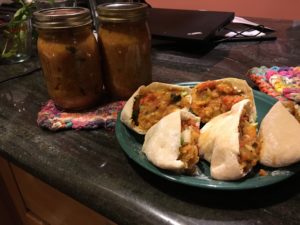 The three pounds of tomatoes that went into this sauce made enough for last night’s meal and the two jars of sauce that are tucked neatly in the freezer for meals sometime in winter.
The three pounds of tomatoes that went into this sauce made enough for last night’s meal and the two jars of sauce that are tucked neatly in the freezer for meals sometime in winter.
Last night’s meal was an experiment – cheese from a local make, pita bread that we made while the sauce was cooking, lettuce pieces from the garden all topped with the freshly made sauce. The wine that washed it all down is from a small, organic vineyard in France – that increased the carbon footprint of the meal – hopefully we will get to go visit and meet the maker so that we can someday say we know our vintner.
The choices we make about food make a big difference beyond the carbon footprint of farming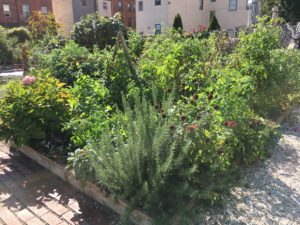 and transporting the food from farm to market. Those choices affect global commerce, the healthful properties of what we eat, the quality of our water, the quality of the air we breathe, the variety of foods available, the viability of small farms and the family farmers who run them, the landfill bound waste stream…. Next time you are in the garden, at the farmer’s market, at the grocery store or even in a restaurant, keep sustainability in mind. It truly begins with food and the choices we make about what is ultimately served on the plate at our tables.
and transporting the food from farm to market. Those choices affect global commerce, the healthful properties of what we eat, the quality of our water, the quality of the air we breathe, the variety of foods available, the viability of small farms and the family farmers who run them, the landfill bound waste stream…. Next time you are in the garden, at the farmer’s market, at the grocery store or even in a restaurant, keep sustainability in mind. It truly begins with food and the choices we make about what is ultimately served on the plate at our tables.
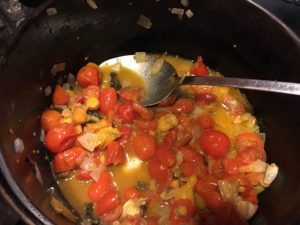

{ 1 comment… read it below or add one }
sounds wonderful…